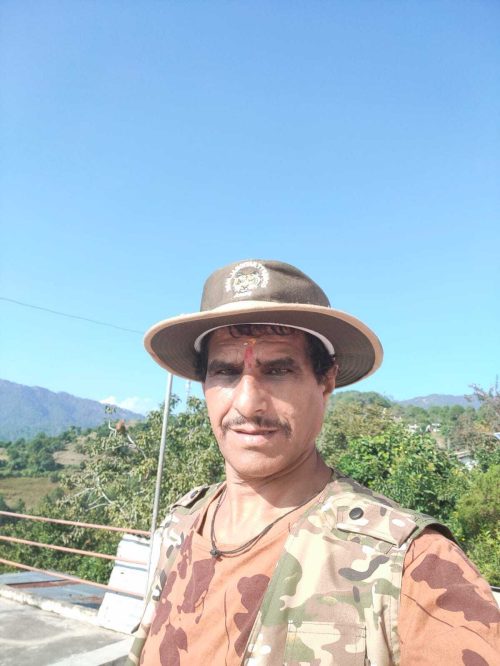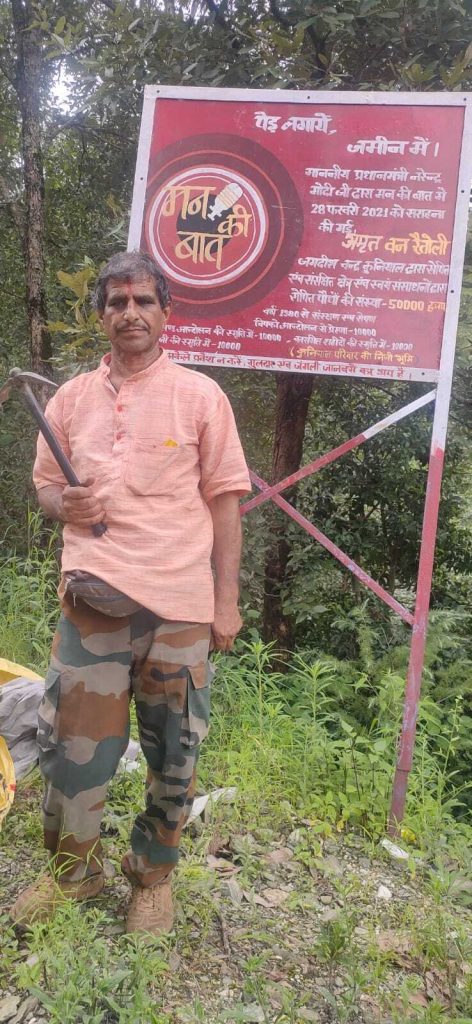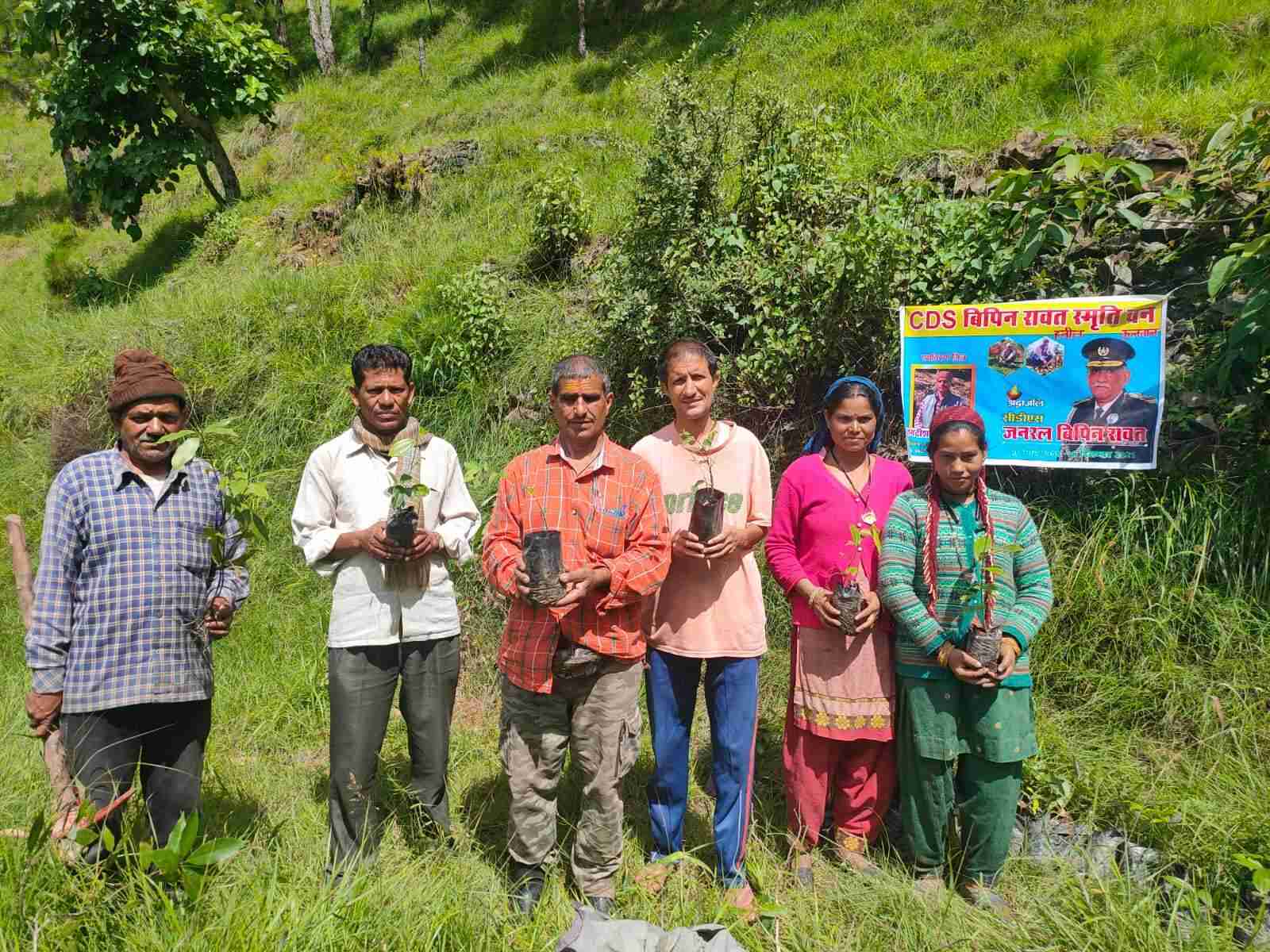“The best time to plant a tree was 20 years ago. The second best time is now.”
In the serene village of Sirkot, tucked away in the picturesque Bageshwar district of Uttarakhand, lives a 60-year-old farmer whose life story is an inspiring testament to perseverance, dedication, and environmental stewardship. Jagdish Chandra Kuniyal’s passion for the environment has not only transformed his own life but has uplifted his community.
For over four decades, he has worked tirelessly to revive his land, plant trees, and create a sustainable future, despite countless challenges. His work came to national attention when Prime Minister Narendra Modi, in his programme, Mann Ki Baat, praised Jagdish’s efforts, a recognition that brought both joy and a sense of fulfilment to the humble farmer.
Jagdish’s journey began in the shadow of personal loss. He lost his father at the age of 18, a pivotal moment in his life that left a deep impact. The tragedy could have crushed him, but instead, it became the catalyst for a life built around resilience and a deep connection to the earth.
“At the age of 20, I made a firm decision to honour my father’s legacy by doing something meaningful with the land he had left behind,” he tells The Better India. In addition to managing his family’s farm, Jagdish also runs a small ration shop, which serves as another way he contributes to his village’s livelihood.
From disappointment to triumph
In 1990, with no formal training but an unshakeable desire to improve his circumstances, Jagdish set out on a mission to plant fruit trees on his land. He began by planting guava and walnut trees, confident that these fruit-bearing trees would thrive and provide a good yield. But, like many ventures, things didn’t go as planned.
“The yield was not great, and I faced numerous challenges. The trees I planted were not growing well, and the results were disappointing,” Jagdish confesses.

But giving up was never an option for Jagdish. Determined to find a solution, he experimented with other tree species that could withstand the region’s harsh climate. He planted seesham, deodar, oak, and rhododendron, and to his delight, these trees flourished.
In the early years, Jagdish’s work was met with scepticism and outright resistance. The villagers, accustomed to traditional farming methods, were quick to question the wisdom of planting trees in the arid, rocky soil of Sirkot.
“They used to say, ‘What’s the point of planting trees here? Nothing will grow’,” he recalls. He kept pushing forward, driven by a belief that something better was possible for the land and its people.
The land itself was as unforgiving as the doubts surrounding his endeavour. The farm was far away from his home, and every day, Jagdish had to trek almost five kilometres by foot to care for the young trees. As if that weren’t enough, irregular rainfall, coupled with the frequent destruction of his plants by wandering cattle, added to his frustration. “Sometimes, the cattle from the village would roam through my fields and trample over the saplings,” he explains.
Despite the numerous challenges, Jagdish remained undeterred, continuously finding innovative solutions. He dug deeper into the soil, reaching underground water sources that would help sustain his plants. Slowly, things began to improve. The trees started to grow, and as they did, the underground water levels began to rise.
The underground water that had been trapped beneath the earth began to resurface. “I started providing water to the people in the village,” Jagdish explains. This simple act made the villagers realise the value of his efforts. What was once seen as a futile endeavour began to yield effective results. “At first, people didn’t understand, but once they saw the water flow, they began to appreciate the work I had put in,” Jagdish reflects.
Venturing into tea
The success of his tree planting efforts gave Jagdish not only the satisfaction of restoring his land but also the fulfilment of knowing that his work had a broader impact on the community. It wasn’t just about improving his yield or securing a livelihood; it was about building something sustainable for future generations.
As the years passed, Jagdish’s success with trees inspired him to think even bigger. The government, recognising the potential of his land, encouraged him to diversify into tea cultivation, a move that would not only add another layer of sustainability to his work but also provide much-needed employment for the local people.
“I started the tea plantations as a way to improve the land and create more employment opportunities,” he says.
Jagdish created jobs for two local workers, who have been with him for over 25 years, caring for the tea plants and maintaining the forests he had planted. This has not only provided stable income for his workers but has also contributed to the long-term sustainability of his land. “I wanted to make sure that people in my village had work and that the land was taken care of,” Jagdish explains.
From recognition to action
In 2021, Jagdish’s life took a remarkable turn when Prime Minister Narendra Modi mentioned his work in Mann Ki Baat. “When I heard that the Prime Minister had mentioned my work, I was overjoyed. I never expected any recognition for what I was doing, I was doing it for my own peace and for the good of future generations,” Jagdish says, his voice filled with humility and pride.
The mention of his name brought a flood of recognition, not just for Jagdish, but for the entire village. “After PM Modi praised my work, people in my village started taking care of the forest and plants. Some of them even began planting trees on their own land,” Jagdish joyfully shares.

“People in my village now understand the importance of planting trees. It’s no longer something that is looked down upon,” he says with pride. The villagers have not only started planting trees on their own lands but have also learnt to take care of them. The once barren land is now dotted with flourishing trees, and the community has embraced the culture of sustainability that Jagdish has worked so hard to cultivate.
With over one lakh trees planted, Jagdish plans to expand his efforts. “I continue to plant more trees across various lands in my village,” he says. His work has become a shining example of environmental guardianship, inspiring others to take proactive steps in safeguarding their own communities.
Despite the recognition and praise, Jagdish remains grounded. “I am happy to see people in my village planting trees, but I am not doing this for any personal gain,” he says. “The true reward for me is knowing that I am leaving behind a better world for the next generation.”
Jagdish’s dedication to his land and his work remains unwavering. His advice is simple yet profound, “Work with sincerity and from the heart. Don’t expect anything in return. Do it because it’s the right thing to do and because it helps others.”
Changing lives, inspiring action
Vinod, a 42-year-old small business owner and farmer, was inspired by Jagdish Kuniyal to start planting trees. “Jagdish gave me plants for my plot and house, and it opened my eyes to how powerful trees are for the environment,” Vinod says. He has planted guava and orange trees at his home, which not only provide fruit but also beautify the area. “Plants give us everything they have — oxygen, shade, and food,” he shares. Vinod encourages others to plant trees, believing it’s one of the simplest ways to help the environment.
Harish Pandey, a 54-year-old farmer, was also motivated by Jagdish. After seeing Jagdish’s garden, he decided to create his own. “Jagdish made me realise that planting trees could benefit not just the land but the whole ecosystem,” Harish recalls. His garden has attracted wildlife, especially monkeys, which he sees as a positive sign of his efforts. “It’s a sign that my plants are thriving and helping the ecosystem,” he says.

Jagdish Kuniyal’s story is a powerful reminder that one person’s actions can create a ripple effect that changes not just their own life but the lives of many others. His dedication to planting trees, restoring his land, and inspiring his community has made a lasting impact on the environment and the people around him. “Whatever work I did, I am very satisfied with it. It was years of hard work, but it has been worth it,” he reflects with contentment.
Jagdish further emphasises, “Consider the well-being of society and start planting trees to combat climate change. The government must introduce policies to protect trees, and people need to recognise the vital role of planting more.” He firmly believes that through collective action, we can make a meaningful impact in addressing climate change and building a sustainable future for all.
“When you plant trees, you must nurture them like your own children. If you give them care, they will repay you with a flourishing future,” he concludes.

No comments:
Post a Comment